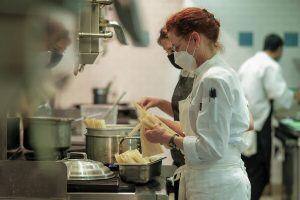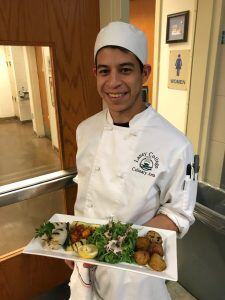Popular culture, from hit television shows to YouTube, portrays the job of a chef as glamorous, exciting and even a bit romantic. With the rise of the superstar chef, many more people are seriously considering the idea of chef as a career choice. They are also wondering if culinary school is worth it to break into the restaurant and hospitality industry.
So You Want to Be a Chef?

A chef at work in the Culinary Arts kitchen at Laney College.
Whether you’re mid-career and looking for a change or exploring the exciting world of a professional chef as your first career, there are many great reasons to become a chef. Once you’ve decided to become a chef, one of the first questions you might have is how to get into the industry. You may then wonder if going to culinary school is worth the expense. Opinions around the question of cost are everywhere ranging from a resounding “yes!” to a “no, not ever.” With so many perspectives on the subject, we’ll look here at some of the benefits and requirements of a culinary education. We’ll offer some insights from industry professionals on the subject so you can make an informed decision whether the cost of culinary school is truly worth it to break into the exciting world of restaurants and hospitality.
Getting Your Start with Dishes
It’s helpful to understand that, no matter if you have a culinary degree or not, there’s a chance you might find the start to your culinary career in a restaurant dish room. This isn’t uncommon or a reflection of your accomplishments, but a path many famous chefs have followed themselves. It’s a matter of learning the trade from the ground up.
Dishwashers are as critical to the effective operation of a restaurant as an executive chef. Michael Chiarello, famous chef and Food Network star got his start as a dishwasher. He was once quoted as saying, “… as that area goes, so goes the rest of the restaurant.” Four-time James Beard Award Winning television personality, Andrew Zimmerman, took a job washing dishes after years working in award-winning New York City restaurants. And, Kevin O’Connor, chef, author and olive oil sommelier got his start at 14 working in a restaurant dish room.
Chef O’Connor and others often recommend the dish room as a path into the industry, to know for certain whether a culinary career really is right for you. It might be sound advice, to gain experience before committing to two or more years of culinary study, even without considering the costs. It’s a tough and rewarding industry. Culinary school will prepare you, but you do need a certain passion and interest in food and hospitality. It’s not always as glamorous as an episode of Chef’s Table.
Culinary school will prepare you, but you do need a certain passion and interest in food and hospitality.
A Culinary Education Explained
Maybe you work or have worked in a kitchen and have decided a culinary education is the right path. Maybe you’ve got the bug and can’t wait to learn how to braise or properly use a chef’s knife. Whatever the case, you’ll want to know a little about a culinary education and what to expect from a culinary degree to know whether culinary school is worth it.
Laney College Culinary Arts classes provide clear learning outcomes for students in their programs. These learning outcomes, created by professional chefs and instructors, prepare students for real work in restaurants and industrial kitchens. Skilled instructors provide real world experience, advice and perspectives. The Culinary Arts department also features well-appointed industrial kitchen “labs” for hands-on learning and practical experience. These lab kitchens are safe, professional environments to learn real restaurant kitchen operations. Laney also boasts a working restaurant which we’ll talk about a little later.
Founded in 1927, Laney College was originally called Central Trade School. The aim of the college was and still is for education and career advancement. It offers vocational certificates and degree or transfer courses. In addition to culinary skills, students can explore general education classes for transfer to four-year colleges. They also have the option to explore other academic interests. Some courses might better prepare students to run a business or guide a diverse team. By comparison, the Culinary Institute of America (CIA), founded in 1946, focuses on “all aspects of food and the enterprises related to it.” In either program, you’ll certainly get a quality culinary education, from qualified instructors. The Laney programs might offer more opportunities and resources to advance your critical thinking skills, and these learned tools and skills may better prepare students for the many different options for a culinary career.
Laney’s Culinary Arts Programs
The Laney College Culinary Arts program offers several degree and certificate programs. These programs prepare you for career success. The two-year Culinary Arts & Restaurant Management Degree provides both education and practical experience. From cooking skills to restaurant operations, courses prepare you to succeed as a chef. You’ll get training in contemporary cuisine, learn and practice knife skills and understand restaurant and kitchen management best practices. The two-year programs teach more than cooking and seasoning meats and vegetables. The programs also teach students how to succeed as a leader, manager and hospitality entrepreneur.

Baking and pastry prep tables at the Laney College of Culinary Arts.
The Baking and Pastry program also prepares you for a rewarding career. In this program you’ll develop skills in classic and modern baking. You’ll also learn pastry decoration and candy and dessert preparation. Both programs take four semesters. After two years of study and kitchen lab work, you earn an industry recognized certificate.
Additional Career Opportunities
Many culinary programs also offer students opportunities to explore internships and jobs. While Laney’s Culinary Arts program does not offer intern credits, the program’s industry network can provide numerous employment opportunities. Network connections are often some of the most valuable aspects of any culinary program. It’s connections made during school that can turn into rewarding careers after graduation. It is also the connections that more costly programs claim are their main program benefits. Your culinary education and network connections create opportunities and open career paths you might not find otherwise.
Your culinary education and network connections create opportunities and open career paths you might not find otherwise.
Laney College Culinary Arts program also offers a Culinary Foundations Certificate. This single year program is for anyone. Home chefs, “foodies,” restaurateurs and industry professionals can gain more confidence in their skills. Program participants develop familiarity with industrial equipment. They advance their understanding and abilities, better understand professional kitchen practices and learn to make diverse and delicious foods. Foundation Certificate students develop a range of principles and skills for a lifetime of joy in the kitchen. Open to all, from novices to experienced chefs, there’s a program and a path for food lovers at Laney Culinary.
The Costs of a Culinary Arts Degree
Do the opportunities of a program match your personal interests or professional goals?
The costs of a culinary arts degree can vary quite dramatically. Most programs offer financial support in the form of financial aid, grants, loans or scholarships. And, like the Laney Culinary program, most schools offer a number of degree, transfer and certificate pathways. Some schools feature Bachelor’s and Master’s degree programs. All of the programs should, and usually do, provide you experience working in scratch kitchens and on galley lines. These settings help develop the required skills and understanding to succeed in a restaurant setting. Many programs offer unique specialties. The Institute of Culinary Education boasts a “bean-to-bar” chocolate lab. CIA Hyde Park maintains a craft brewery. Laney College operates the Laney Bistro. Students working in the Bistro apply their learning to the real time preparation and service of seasonally authentic foods to customers a few evenings a week. One patron of the Laney Bistro calls it “… one of the best kept secrets in Oakland – a real treasure!” When evaluating the cost of your culinary education, you should consider the additional offerings. Do the opportunities of a program match your personal interests or professional goals?
Culinary School Tuition and Living Expenses
The Cost of tuition at the Culinary Institute of America is around $20,000 per semester. This is the direct cost for tuition and doesn’t include living expenses, like rent, books, food and supplies. A diploma from the Institute of Culinary Education in 2023 will have a direct cost of somewhere between $35,000 and $50,000.

A Laney College Culinary Arts Student with a dish prepared in culinary arts class.
Culinary arts programs are intensive. Classes happen daily and it can be challenging to work while studying. You may require student loans or extra financial support. It is programs like those at CIA or ICE where the high costs of a culinary education are truly up for debate. This is particularly important when the median salary for a head chef is $56,520 in 2022, according to the U.S. Bureau of Labor Statistics. So, while you may make great networking connections and learn from some very skilled specialists at many of these programs, it’s tough to repay a student loan on these expected salaries. The good news is, you can get a world-class education from skilled professionals and build a rewarding network at programs offered through local colleges, like Laney College.
The faculty at Laney’s Culinary Arts programs are accomplished and award-winning chefs, just like those at other programs. Many are also successful restaurant business owners and entrepreneurs. With experience in respected kitchens and restaurants around the world, these professionals offer both practical expertise and industry connections to students in the Culinary Arts program. They’re also enthusiastic educators inspired to teach what they know.
Financial Aid for Culinary Arts
Laney College provides financial support to all students. Grants and other financial aid is available for qualifying students and many students attend the Laney’s Culinary Arts program and earn a certificate degree at little or no cost. The programs are as detailed as those at other schools and the tuition and fees can be almost completely covered by financial aid. This means students can earn a leading and practical culinary education without the burdens of student loan debt.
In some instances, tuition at Laney can be completely free of charge.
Direct tuition costs for a Culinary Arts and Restaurant Management Certificate at Laney College is $46 per unit. The total costs for a certificate is about $1,794 at the time of this writing. Compare this to the $20,000 per semester price tag at CIA. In some instances, tuition at Laney can be completely free of charge. This is not to suggest that a CIA education isn’t worth the expense; it would certainly expose you to a world of culinary excellence. But, the same practical education, the same fundamentals and a remarkable experience are available to students through programs like those at Laney College.
Added Value of a Laney Culinary Education
In addition to affordable tuition and dedicated, experienced instructors, there are added benefits to attending Laney Culinary. Students of every age, from every walk of life take courses at Laney College. Restaurateurs and business owners attend Laney Culinary to refine their craft and improve their skills. And, Oakland and the Bay Area are home to some of the greatest restaurants, hotels, bars and hospitality in the world. The network of opportunities for Laney Culinary students is in the geography and the community. This added value, for an affordable education and the ambitious student is nearly incalculable.
Learn More About Laney College
The faculty and staff at Laney College are dedicated to your success. You’ll find all the answers you need to enroll at Laney.edu. The Laney College Culinary Arts home page has program details and class lists. You will also find contact information for instructors and the Department Chair if you have specific questions about the program. To enroll or learn more about financial aid and tuition, visit the Laney College enrollment page. You’ll find how easy it is to enroll and start your journey to an affordable, world-class education in hospitality and the Culinary Arts.
The value of a professional culinary education is evident at Laney College Culinary Arts. The program is great for those exploring career options. It’s engaging for mid-career professionals looking to advance. And, it’s an ideal program for those looking for a career change or explore opportunities in the hospitality industry. So, if you are interested in making great food, building skills, or becoming the next great TikTok chef, start your culinary journey at Laney Culinary. It’s world class and so worth it!

